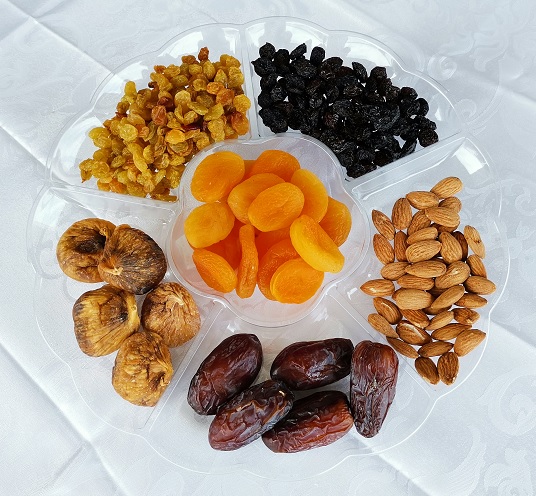Trees.
Tithes.
And the number 15.
Welcome to Tu BiShvat, the New Year of the Trees.
- What is Tu BiShvat?
- What does Tu BiShvat mean?
- What are the origins of Tu BiShvat?
- How do you celebrate Tu BiShvat? What are the rituals and traditions of Tu BiShvat?
- When is Tu BiShvat?
What is Tu BiShvat?
Tu BiShvat is a Jewish holiday celebrating the New Year of the trees.
It is celebrated on the 15th day of the Hebrew month of Shevat, which is the eleventh month of the Hebrew calendar. It means that the holiday usually occurs during late January to late February.
What does Tu BiShvat mean?
Well, Tu BiShvat literally means Shevat 15th, the 15th day of the month Shevat.
Why? Since in Hebrew, the T in Tu stands for the letter Tet (the ninth letter of the Hebrew alphabet, with a numerical value of 9) and the u in Tu stands for the letter Vav (the sixth letter of the Hebrew alphabet, with a numerical value of 6). So the numerical value of Tu is 9 + 6, which is 15.
As you may know, the Jewish calendar has four different “new years”.
One is a new year for kings and festivals, during the first month of the Hebrew calendar – the month of Nisan.
One is a new year for the tithe of cattle, during the last month of the Hebrew calendar – the month of Elul.
One is a new year for calculating years, sabbatical years, jubilees, planting, and for the tithe of vegetables. This is during the seventh month of the Hebrew calendar – the month of Tishrei.
And, of course, one is a new year for trees – Tu BiShvat.
At this point you might wonder – why do trees need a new year?
And that is a very good question indeed.
The answer lies in biblical tithes and prohibitions.
The first prohibition is on eating the fruit of trees if the fruit was produced during the first three years after the trees were planted.
The fruit crops of the fourth year are an offering of praise to God.
Several other tithes exist, and they involve the setting aside of one tenth of specific agricultural produce during the first, second, fourth and fifth years of each seven-year cycle.
So this date – Tu BiShvat – is actually used as the cut-off date in the Hebrew calendar for calculating the age of a fruit-bearing tree.

What are the origins of Tu BiShvat?
The Book of Leviticus, which is the third book of the Hebrew Bible, mentions the prohibition on eating the fruit of trees for three years after they are planted, as well as the fruit crops of the fourth year being an offering of praise to God.
Leviticus 19:34-24 says:
“And when ye shall come into the land, and shall have planted all manner of trees for food, then ye shall count the fruit thereof as forbidden; three years shall it be as forbidden unto you; it shall not be eaten. And in the fourth year all the fruit thereof shall be holy, for giving praise unto the LORD.”
The Book of Deuteronomy, which is the fifth book of the Hebrew Bible, also mentions multiple tithes that were calculated by whether the fruit ripened before or after Tu BiShvat.
How do you celebrate Tu BiShvat? What are the rituals and traditions of Tu BiShvat?
Since Tu BiShvat is about trees, fruit and agriculture, you celebrate the holiday with food – mainly dried fruits and nuts.
The most popular dried fruits and nuts are figs, dates, raisins, carob, and almonds.
Since the agricultural laws in the Hebrew Bible were meant for agriculture in Israel, it is customary to eat at least one of the Seven Species associated with the Land of Israel in the Bible – wheat, barley, grapes, figs, pomegranates, olives and dates.
Many even eat the etrog from Sukkot (usually in preserved or heavily sugared form…).
After eating the fruit, the Jews recite a blessing thanking God for the crop – “Blessed are You, Lord our God, King of the universe, who creates the fruit of the tree.”
In Israel, Tu BiShvat is an Arbor Day, a day in which individuals and groups are encouraged to plant trees. As well as environmental awareness, this symbolizes the connection between the Jewish people and the Land of Israel.
It began with the early Zionist settlers that revived the agriculture in Israel, planted trees and restored both the physical and metaphoric roots of the Jews in the Holy Land. This habit continues to this day, when tens of thousands of Israelis take part in Tu BiShvat tree-planting activities every year!
When is Tu BiShvat?
2021 – begins in the evening of Wednesday, 27 January and ends in the evening of Thursday, 28 January
2022 – begins in the evening of Sunday, 16 January and ends in the evening of Monday, 17 January
2023 – begins in the evening of Sunday, 5 February and ends in the evening of Monday, 6 February
2024 – begins in the evening of Wednesday, 24 January and ends in the evening of Thursday, 25 January
2025 – begins in the evening of Wednesday, 12 February and ends in the evening of Thursday, 13 February

